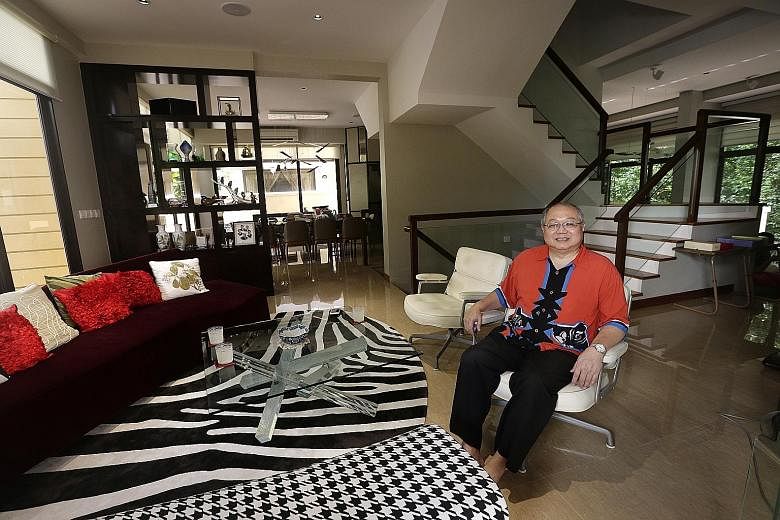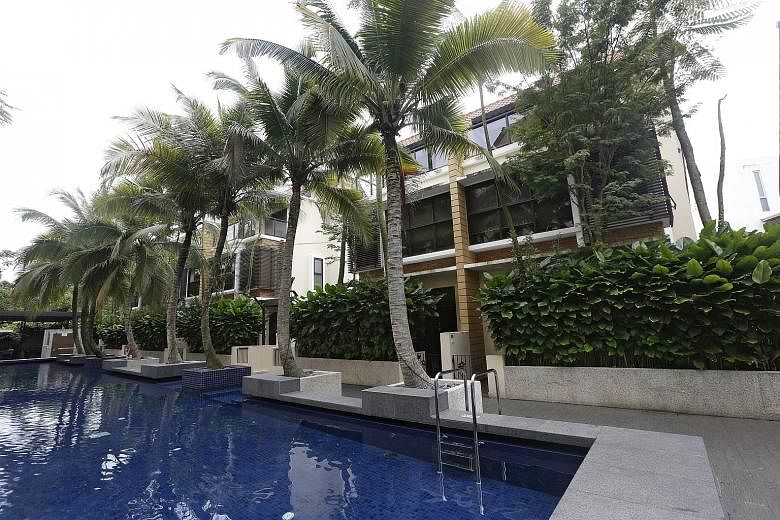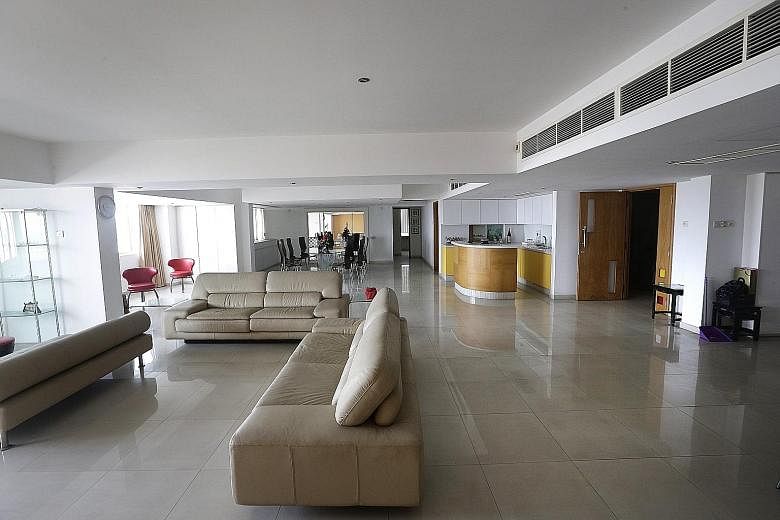Former corporate bigwig Lim How Teck loves partying at home.
The effusive former group chief financial officer of Neptune Orient Lines says it would be near impossible for him to live "somewhere with nice rolling land, with the mountain behind and sea in front".
"I'm not the outdoor type and I'm a social creature. I like to be in a place where I'm surrounded with friends so I can interact with them when I'm old, play mahjong once or twice a week and travel together. I invite friends for lunch every fortnight at 11.30am," says Mr Lim, 67, who sits on the board of at least eight companies.
Being an affable host means he has to find a suitable place for his soirees, and this is one reason he bought his current 7,600 sq ft home in Bukit Timah.
His wife is a retired bank officer and his two children, aged 28 and 34, live at home.
"As I age, I like to hear young voices. Silence is not naturally golden, so hearing the laughter from my neighbours is invigorating. I entertain guests once a month, usually a group of eight people - good friends, business associates. If my children are free, they'll join in as well."
Q What's your property like?
A About two years ago, I moved to a cluster housing development that had an emphasis on greenery and being close to nature, which was what I wanted.
I bought a pair of semi-detached houses for about $4 million each, and asked the developer to allow me to connect them seamlessly to create a "bungalow-style" home. If I were to buy a good-class bungalow (GCB) instead, I wouldn't have as much disposable income.
The combination has adequate space - 7,600 sq ft, built-in - for the family and a home office, and six dedicated basement carpark spaces to protect my cars, including a Maserati GTS, from the harsh sun.
Q Tell us about your property portfolio.
A I own a unique three-apartment combination as a single unit in Upper Bukit Timah Road, with a total gross area of 5,700 sq ft.
I had two units side by side on the 21st floor, and another unit on the 20th floor directly below one of the upper units that is connected by an internal staircase.
The common walls between the 21st-floor units were torn down for a bigger open area that became a new living and dining room with a bar counter, bar-wash area, built-in wine chillers and such.
The new living-and-dining area used to be two dining-and-living rooms, a bedroom and balcony space. It's about 1,500 sq ft and good for entertaining.
The whole set-up is ideal for three-generation families who love big spaces to entertain relatives and friends. I'm looking for someone who's interested in that to sell it to.
Suggestions have been made to me to split the three units and sell them separately all over again. I spent $500,000 tearing it down and doing it up. If I have to spend another few hundred thousand to tear it down, it doesn't make sense or add value.
The first unit, I bought in 1997, the other two units in 2004 - and the combined figure was less than $2 million.
I have more than three properties. The best investment I made was in a 4,600 sq ft penthouse off Grange Road on the 28th floor. I bought it for slightly over $2 million and renovated it for $300,000. I changed the bathrooms so they are of the standard of a five-star hotel, to suit expatriates.
In the 20 years I had it, on average I could rent it out for $10,000 a month. I sold it in 2013 at the peak of the property cycle for more than $5 million. My wife was sad as she oversaw the renovations but I said we had to take the profit for that cycle.
Q Describe your property investing strategy and market view.
A The best rental yield comes from a Housing Board (HDB) flat. If you have a three-room HDB flat that cost more than $200,000, you could probably rent it out at $1,800.
With a GCB which costs 100 times more than the HDB, you're unlikely to get a rental that's 100 times of $1,800, maybe barely 10 times.
I tell the younger generation there's no stigma in buying HDB. If you're posted overseas to work, you even have the right to rent it out. There's also capital appreciation, and the Government gives a first-time subsidy, so enjoy that.
I started with an HUDC unit in Braddell View.
What sort of asset will let you borrow four times the leverage? Also, when you own 10 properties, you don't have to monitor them every day, unlike stocks. With 10 different asset classes, the degree of complexity is much higher.
Property is the one class that lends itself to this sort of leverage and the ease of earning rental income, which can be used for bank repayments.
Looking at management of assets as you age, property should be about 40 per cent of your total assets, and 60 per cent in stocks and other investments that allow you to have a higher disposable income and standard of living.
If you have $30 million worth of assets, you don't want to sink it all into a GCB and have no cash to travel and such. I enjoy a good car, for instance. However, if you have $100 million, that's a different story.
Instead, I'd consider dividing the investment amount into six medium-sized properties. You can buy a number of penthouses, for instance.
There is no need to lock up too much money in hard property assets without the flexibility of enjoying the fruits of our labour.
One of the strategies I subscribe to is: Sell the properties as you age. The first one can be sold at 60 years old, and then, every five years. By 80, you'd have sold four properties and still have two left for your children.
From 2004 to 2013, the prices of property have gone up three to four times on average. The cooling measures have been in place for quite a while. The total debt servicing ratio has worked wonders in tapering demand, which may not be sustainable. It would be wonderful if the additional buyer's stamp duty for Singaporeans could be relaxed sooner rather than later, as many have been forced to buy their second or third property in Australia or Britain, taking currency risk.
With the total debt servicing ratio, no one can speculate. Unless you have a lot of money, Singapore is the best place to invest as it has finite land. There is no "worst" property investment if you hold it for the long term.
Q What's your overall investing strategy?
A I invest in private equity, which is about 10 per cent to 15 per cent of my portfolio. Stocks on the Singapore Exchange make up 30 per cent and the rest are in cash.
I invest a lot in real estate investment trusts (Reits) for dividend yield and prefer them over bonds.
While Reits are considered equities, people forget the trusts hold assets. When you buy a bond and the firm collapses, that's more dangerous. I've previously held shares in ARA Asset Management, which has been delisted.
When it comes to private equity, you have to spread your investments thinly as most of those investments die. If you invest in 10 and get four right, that's lucky. Those that get it right should have a return that's three to four times of your investment. One to two times is not ideal.
Q My dream home is...
A Still something like my current home, where I can hold more parties, invite people and cook. If I could afford to buy something bigger, I would, but I can't and it's too late. I'd cut the coat according to the cloth and not lament something I can't achieve.
VIDEO
How he combined two cluster houses into one home: str.sg/4rq5




